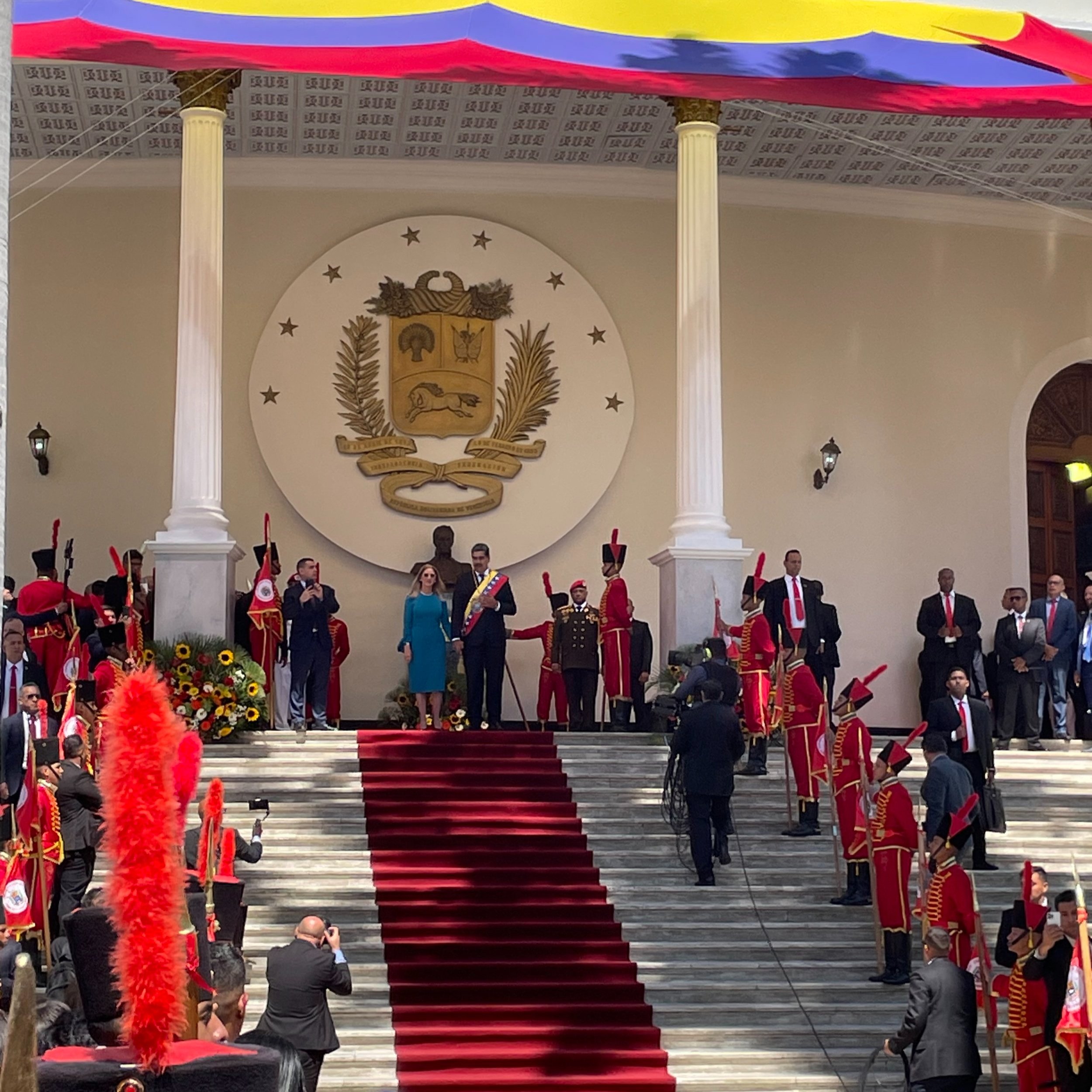Maduro's inauguration is done. What now?
President Nicolás Maduro and “First Combatant” Cilia Flores appear outside the Elliptical Hall of the National Assembly right after the swearing ceremony, on 10 January 2025. Elias Ferrer.
On 10 January, Venezuela’s incumbent president Nicolás Maduro was sworn in for a third term, amidst accusations of electoral fraud.
The inauguration ceremony took place in a smaller, more secure hall than the traditional venue; the Salón Elíptico instead of the Hemiciclo, without the presence of the press.
For the entire week, the streets were covered by checkpoints and patrols by the national police, the PNB; military counterintelligence, the DGCIM; and civilian intelligence, the SEBIN. On the day, Maduro supporters also staged a long march across the main cities.
Marked by controversy, the inauguration ceremony only received three heads of state: Cuba’s Miguel Diaz-Canel, Nicaragua’s Daniel Ortega, and Antigua and Barbuda’s Gaston Browne.
Most friendly countries sent delegations with the head of the legislature—the Speaker of the House in the United States. These include China, Russia, Algeria, and Serbia. Few European or Latin American states sent delegations; about half of the latter group do not even have diplomatic relations with Venezuela.
There were many delegations of supportive political organisations from foreign countries. Other notable guests at the ceremony were the secretary generals of OPEC and the Gas Exporting Countries Forum. In all, Maduro said that there were representatives of 125 countries.
Opposition support fizzles out
Different polls show that many Venezuelan opposition supporters had high hopes for the date. The movement’s leader, Maria Corina Machado had said that, since Edmundo González had won the 28 July election, he would be inaugurated on 10 January. González himself repeated the promise.
Simultaneously, Erick Prince, the founder of private military company Blackwater, claimed to have a plan to oust Maduro. Although in 2019, Prince tried to cozy up to his government, meeting with Vice President Delcy Rodríguez.
On 9 January, Machado and González aimed for mass mobilisations across the country to make a show of strength. It would be especially important for Donald Trump to see them, as he is due for his own inauguration on 20 January.
However, the day only saw small rallies in some cities, with no more than four thousand gathering in Caracas. This was in stark contrast with pre-election rallies, or the mass protests of 2017 and earlier years. A months-long campaign of repression and intimidation worked.
Machado came out of hiding to join her supporters, and alleged to have been briefly detained by security forces. Government officials said that she was never taken into custody, and shared a strange video of her saying that she was not arrested.
At this point, how will the opposition move forward? High-profile figures in exile, including Leopoldo López, are promoting the idea of removing OFAC licenses which allow Western oil companies to do business in Venezuela. Some are also backing the idea of a military invasion, recently put forward by former Colombian president Álvaro Uribe.
Other leaders are instead seeking a deal to participate in local, regional, and legislative elections due this year. Already two major parties, Acción Democrática and Un Nuevo Tiempo, broke off with the opposition’s government-in-exile in order to do so.
This second group will have a hard time galvanising their support base, as many voters now believe that elections are pointless. Various opposition politicians also face accusations of being in cahoots with Maduro.
Nicolas Maduro and Cilia Flores wave to the crowd, in a parade after his inauguration on 10 January 2025. Interior minister Diosdado Cabello drives the truck. Prensa Presidencial.
How will the Trump administration react?
The Biden administration leaves having introduced symbolic, ineffective punishments. Since the 28 July vote, the OFAC has announced three rounds of sanctions on Venezuelan government officials and military leaders. In the last round, it was accompanied by the United Kingdom, the European Union, and Canada.
The State Department also increased rewards for Maduro and Diosdado Cabello to $25 million, and created another for Defence Minister Vladimir Padrino for $15 million. The rationale has been to punish those who facilitated the election fraud and the subsequent repression.
The incoming Trump administration is likely considering two options:
Punish the Maduro regime: blanket sanctions on regime officials and the economy—removing licenses on oil companies. This could happen if Marco Rubio gets the upper hand in deciding Venezuela policy.
Leverage sanctions and licenses: push for U.S. interests over immigration, drug trafficking, the oil industry, and geopolitical rivalries. Presidential Envoy for Special Missions Richard Grenell and other MAGA Republicans could prefer this strategy.
Neither of the two options represents a realistic plan to topple the Maduro government. In the past, sanctions and threats of military attacks have helped Chavismo to rally together. In the long term, the secondary effects from either strategy could lead to change in government, but that would probably be beyond the four-year U.S. presidential term.


